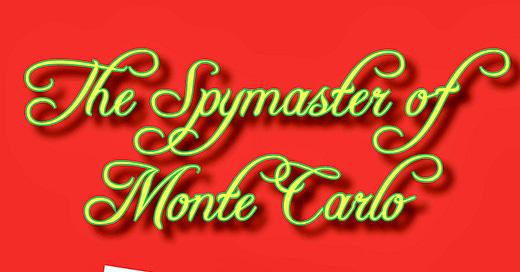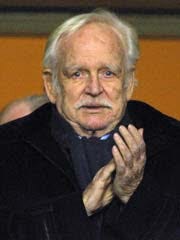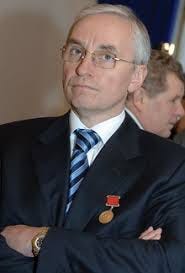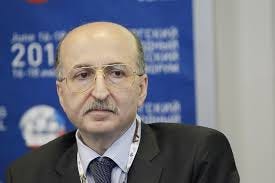THE SPYMASTER OF MONTE CARLO: 35) FRIDAY THE 13TH
A Throwback Thursday Memoir of Intrigue & Lunacy
January 2006
As 2006 began, I returned to London dispirited but focused on finishing the report about Philippe Narmino I was tasked to write for Prince Albert.
With it in hand, I traveled from London to Monaco on January 5th.
Early next morning, the prince called to say, “One, I’m back [from Cape Town and a hunting lodge in Ethiopia], two, I’m sorry [for not getting back to you before Christmas], and three... I can’t remember.”
I set out on foot for a 9:15 a.m. meeting with JLA at the Palace, and saw his office for the first time. (We normally met at M-Base in the interest of preserving my unofficial—invisible—status.)
This space was rather different from JLA’s grand Lagardere office in Paris—about one-fifth the size, more of a cubby hole.
As for breakfast: one bottle of Evian water, for which the Palace charged him three euros.
I presented my report on Philippe Narmino.
JLA read it voraciously as I sat with him:
People talk in Monaco. Gossip runs rampant. There is no doubt that rumormongering is the principality’s national pastime. Throw in job jostling, backstabbing, and personal agendas, and one has a prescription for misinformation, disinformation and outright lies.
But there is a difference between idle or deceptive chatter in bars and hairdressing salons and reports produced by trained professional police intelligence officers. (The former is counter-productive, but the latter crucial for informed decision-making.)
While it is true that intelligence is only as good as the sources who provide it, it is also true that professional intelligence officers give great care to assessing both the information they receive and the credibility of the sources from whom they receive it. When the system occasionally goes wrong (i.e. WMD in Iraq), it is because governments and politicians sometimes select what they wish to hear or interpret ambiguous reporting their own way.
Good intelligence is not based on hearing a rumor from one source, writing it down, and reporting it to the decision-maker.
Good intelligence is an objective process that takes many weeks or months of collection from multiple sources, followed by careful analysis.
Which brings us to the case of Philippe Narmino.
While we realize a decision must be made imminently on whether or not to appoint Narmino to a very senior government job, our investigation of him remains incomplete.
Unanswered questions persist.
If Narmino has engaged in corrupt practices, and if indeed there are special interests that believe they have Narmino in their pocket, his appointment as head of Monaco’s judicial service will endanger the principality and the reign of Prince Albert II.
(One point has become very clear through our investigation of Narmino: the officers of SIGER are frightened of the harm Narmino can cause to their careers. This has hampered our investigation from the beginning. In addition, we are investigating others who are close to Narmino and who believe that he is their “get-out-of-jail-free” card. Hence, whether Narmino is appointed or not, SIGER should be given insulation to investigate government officials without fear of retribution.)
Thus ensued a catalog of alleged impropriety, conflict of interest, grand theft and fraud.
JLA summoned Claude Palmero, the Palace accountant, to join us in his office for a discussion of this report.
Palmero read the report in front of me.
When he came upon the phrase Get-out-of-jail-free card, Palmero nodded excitedly.
“Yes, I have seen this! Maruani [Narmino’s special friend] got out of jail free when he was implicated in the Hobbs-Melville scandal.” (Palmero should talk. He was the Hobbs-Melville accountant!)
Continued Palmero about Prince Rainier:
“He wasn’t even a shadow of himself during the last two-to-three years. He wasn’t there. He could not even discuss his own personal affairs. He signed whatever Madame Siri [his personal secretary, some say mistress, through whom he is thought to have sired an illegitimate son] put before his eyes.”
This was the period when those around Rainier, who had become feeble-minded—possibly senile—exploited his weakness, his ill health, and his mental incapacity, and ran rampant with awards and Monegasque passports and job appointments and future job promises.
And where was the Hereditary Prince Albert during that time?
The courtesans kept him busy, in the dark and on the road, where he happily traveled the world, not responsible for substantive decisions in Monaco and irresponsible in his behavior, enticed by the likes of Robert Munsch and others to behave like a college sophomore well into his forties.
JLA had already spoken with President Chirac’s chef de cabinet and prepared the French for the prospect that Narmino would not get the job and that they would be asked to propose someone suitable.
But JLA phoned late that evening to tell me the prince was inclined to proceed with the Narmino appointment on the basis of “no evidence,” pending a meeting with me at the weekend so I could make my case.
Said JLA sardonically, “He [Narmino] hasn’t killed anyone—has he?”
This was not about evidence. This was about doubt.
And we had damn good reason to doubt Narmino's suitability as chief of judicial services.
The prince arrived at M-Base at 7:30 next evening, and we talked, one-on-one, for two-and-a-half hours over martinis and sandwiches.
We began with Narmino, evidence versus doubt:
If Narmino was under criminal investigation, I reasoned, we would of course need evidence to arrest and convict him.
But doubt about his honesty was enough to preclude appointment to a job.
And this was not just any job, but a top job as chief of judicial services, a service based upon honesty and integrity.
We had a hell of a lot of doubt about Narmino’s honesty and his integrity.
By not appointing him, I argued, the prince risked a few days political flak.
But such an appointment could potentially haunt his reign for many years.
“You are on a roll,” I counseled, “and building momentum, with Biancheri [sidelined] and with Thatcher [expelled]. Don’t brake now.”
“But it’s something my father started,” Albert countered.
“It wasn’t your father,” I replied. “It was the people around him—the crowd that needs to be cleaned out.”
I added that the French wouldn’t care; that they would actually applaud the prince’s strength and willingness to be his own man instead of operating in his late father’s shadow.
As for the prince’s subjects in Monaco, not appointing Narmino would send shockwaves, indeed—but they would be positive shockwaves, undoing what those around Rainier conspired to achieve after his death.
When I concluded my impassioned plea, Albert told me he was inclined not to appoint Narmino.
But if he chose to go ahead with the appointment—I made him promise, and he did—I would have two weeks to find a smoking gun.
The prince was astonished to hear from me that SIGER could not officially access records from Monaco’s maritime registry, or other such registries, and had to pull favors for this, thus hampering investigations and frustrating our efforts to gain documentary evidence against Narmino.
He vowed to proceed with my plan to reorganize and strengthen SIGER with wider access.
Next, we discussed the police chief, whom I believed had to go.
The prince agreed, confirming that he would not renew the chief’s tenure in July.
I recounted for the prince my experience with Rotolo and Jazmin.
He was flabbergasted and agreed that any settlement to recognize Jazmin as his daughter should take into account her mother’s apparent alcohol problem to safeguard Jazmin’s well being.
Albert also agreed that a boarding school in Europe was a good idea.
(Later, he apparently told Thierry Lacoste, “I don’t want her going to school in Europe.” I daresay, it wasn't the first time Albert spoke from both sides of his mouth.)
I conveyed to the prince what I had heard about Bruno Philipponnat’s financial relationship with Red Bull.
“He has overstepped his bounds,” Albert commented, adding that he’d caught flak from Stephane Valeri and Jean-Paul Proust over Philipponnat’s shady dealings.
As for Igor Yurgens: The Prince shared my incredulity that the external affairs ministry did not possess a dossier on the man who would supposedly be Monaco’s consul to Moscow.
Thus, I briefed the Prince on Igor Yurevitch Yurgens, born November 6th, 1962 in Moscow, nominated on November 4th, 2005 (nobody knew by whom) to be Consul General de Monaco.
He worked in Paris in the mid-1980s, as an interpreter for UNESCO, but in fact was a KGB officer, operating undercover, whose specialties were labor unions and disinformation.
In Monaco, Yurgens linked to Petro Trade, a Russian company on our radar screen that linked to money laundering and President Putin personally.
I advised the prince that former employment with the KGB should disqualify Yurgens from representing Monaco in Moscow.
Next, David Iakobachvili: born March 2nd, 1957 in Tblissi, Georgia, with Swedish nationality,
Iakobachvili linked, since the 1990s, to Baumanskaya, a branch of the Solntsevo organized crime group.
In 1995, Iakobachvili was questioned in France on behalf of the Kazakhstan Republic in a case of corruption and embezzlement of public funds through a company in Nice called Mediterranean Trade Invest, set up in Valbonne in 1990.
Iakobachvili had been in a partner in two Russian companies—Cherri Casino and Trinity Motors—linked to organized crime figures; his partner at Trinity Motors, Vladislas Vigorbin was murdered in 1995 in Moscow.
Vigorbin was an active member in the Baumanskaya organized crime group, which specialized in cocaine traffic and money laundering.
Furthermore, we had collected intelligence suggesting Iacobachvili had deposited money into an investment fund in Geneva called Ficogex SA, which then passed money to a Geneva company—Atrax Properties Ltd—owned by Conseil National President Stephane Valeri in the name of Maurice Christie, a Swiss nominee and the company’s manager.
Hence, it looked as though Valeri received money from Iakobachvili to support his presence in Monaco.
Iakobachvili had wanted a bank account in Monaco, but was blocked until Valeri interceded on his behalf and got HSBC chairman Gerard Cohen to personally approve an account.
On JLA: I sang his praises from my heart:
JLA reached his office by 7:30 each morning and remained until midnight most weeknights.
The bureaucrats were upset, because they finally had to work, and the government was upset because, for the first time in ten years, the Palace was running the principality, as the constitution intended.
“Try twenty,” the prince commented.
At meeting’s end, Albert delighted in telling me that while in Cape Town at a New Year’s Eve party thrown by Preston Haskins, he had become reacquainted with a South African swimmer named Charlene Wittstock.
The glint in his the eye suggested he actually felt something for her.
Which meant that his male entourage, starting with Bruno Philipponnat, might soon be looking to sabotage the relationship, as it would hinder the visiting of strip-clubs and brothels and womanizing on the prince’s coattails.
This is what had happened five years earlier when Albert had a girlfriend he was serious about named Alicia Warlick.
The fellers around the prince conspired to keep him out all night following a Princess Grace Foundation gala in New York while Alicia waited alone in his hotel room.
Finally, when he had not returned by morning, she instructed aide-de-camp Thierry Jouan to call her a taxi for the airport. And that was the end of that.
I connected with JLA early next afternoon to brief him on my extensive meeting with the prince.
Doubt, not evidence, was enough to preclude Narmino from the top job at justice; and if the prince changed his mind, I’d have two weeks to scramble and muster.
JLA asked me, “Should Narmino be removed from his job [as judge]?”
“In my opinion, yes,” I said. “But for that we should have more, so we'll keep digging."
I arrived back at M-Base late in the evening to find it ransacked, electricity out, and masked intruders lurking in the darkness.
Another dream.
Next day, JLA phoned to inform me the prince, again, leaned in favor of appointing Narmino.
This seemed to fit with what I heard about Albert: he went along with whoever was last in his presence.
JLA gave me nine days to produce a smoking gun.
Two days later, another call from JLA: The prince was anxious to sign the Narmino appointment, his two-week promise to me notwithstanding. JLA was doing his best to stave it off.
Two days later, Albert phoned me: The only thing in our Narmino report that concerned him, he said, was the alleged misappropriation of the Red Cross painting.
He told me he did not care about the corrupt Brianti/Ageprim valuation commissions, the expensive gifts or the lies about his personal life, which in my mind opened him to potential blackmail.
“Gifts have been a way of life in Monaco,” said the prince, as if he’d been reprogrammed since our last marathon meeting, by whoever he’d last seen.
In any case, it was that way of life Albert had pledged to change through his self-proclaimed new ethic.
The prince signed the appointment of Narmino to chief of judicial services that Friday, the 13th of January.
Prince Albert knew that Narmino was the most dangerously corrupt of bad actors in Monaco; as crooked, in fact, as a sack full of snakes—and appointed him anyway.
His conciliation was to allow me to keep our investigation alive.
But the damage was done.
Serious, wide-ranging damage.
Twelve years later, Narmino was forced to resign in disgrace after public exposure in the media for corruption.
Soon thereafter, Narmino was indicted.
Such vindication brought me no joy, only sadness for the country I tried so very hard to protect.










